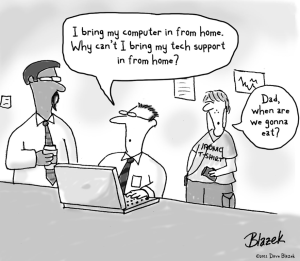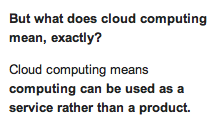A very topical topic for this post – cloud computing. It’s everywhere and growing exponentially. I love the photo below – taken down our road of the telegraph pole (is that still the right term for it?) that pretty much every telephone (and therefore broadband connection) down this part of the road comes from…
Cloud technology is now and it’s about using computing as a utility service – i.e. you use and pay for what you need, when you need it and even where you need it. Versus the more traditional approach of doing everything locally where you are and investing in your own (quite often expensive) hardware and software. It’s not a new approach as such, and has similarities with the mainframe services from way back.
A great example of cloud computing, is in the consumer world with smartphones. I expect to be able to access my e-mails, music, photos, videos, documents and more, wherever and whenever I want and in the way I want. I don’t want to have to sit down at a designated computer (yes even my lovely iMac) and only be able to access things then. What if I’m away and need something urgently? Cloud computing means I can use services that store my data for me and that I can access through the “cloud” – i.e. with an internet connection. Not just my data but tools and utilities and applications that I want to use as well. My smartphone is my access portal to the cloud.
Here’s a link to a great blog post from Kevin Fielder – a fellow IT professional (specialising in security) – that talks about this more and also 2 other current trends we’re seeing in technology, that all link together:
- BYOD – bring your own device
- Consumerisation of IT
Both phrases I’m sure most people have heard of as well. But what are they?
In short BYOD is the cultural change over recent years where businesses are allowing their employees to bring in and use their own technology equipment at work and accessing their work technology resources (e.g. e-mail) through that device. Yes there are security and support implications but these need to be and are being resolved. Gone are the days when my work technology equipment is by default the latest and greatest, it’s me the consumer driving this (with the latest smartphone or tablet) and I want all my data – work and personal – accessible in one place, and yes I can be more productive like that.
The consumerisation of IT fits neatly in here as well. As Kevin rightly says, it’s about the blurring of the differences between technology at businesses and for consumers. I want to be able to do everything from one device, whenever and wherever I want. And hey if it’s my device, I’ve paid for it and I’m more than likely paying for any monthly charges! Think about that.
The image above shows cloud computing more from a business standpoint, showing what type of services I (as a business) can access through the cloud. Creating technology as a true utility service – much like businesses use electricity (without their own generators to create their own) – means that businesses can focus on what they do best and still deliver services using the best technology without massive investments that have to be depreciated after a few years and yes then upgraded.
Another great definition of cloud computing is below…
And going back to my first photo to finish. Although I’m now using the cloud for my technology, I’m still reliant on this older technology (through the telegraph pole) to get my access. If that’s not there I’m stuffed quite frankly – not internet connection. Where’s the redundancy here? What have my (my road’s) telco provider done to ensure continuity of service if a storm blows this down? Are consumers thinking about this? Not really. What about businesses? As part of any move to the cloud, businesses need to look at considerations like this urgently.









































